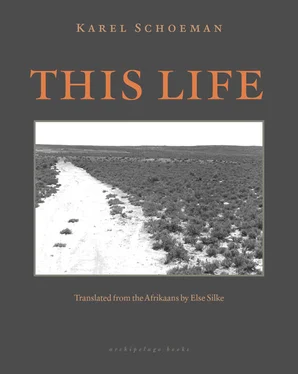At the time that Pieter was married, while the new house was nearing completion, Maans became Member of Parliament. Despite being quiet and modest, he had gone ahead in our community, and when they wanted to establish a branch of the Broederbond in our district, they encouraged him to serve on the committee. He baulked then and declared that he was not a man for politics but later, when parliamentary elections were due, they approached him again and he agreed. Why? As he himself had said, he was not interested in politics and he was not an ambitious or assertive man; but no one from our parts had ever been elected to Parliament before, and it was the best Stienie could still strive for, to be a Member of Parliament’s wife who goes to Cape Town every year and socialises with all the important people. Thus Maans travelled in the district to talk to the people and solicit votes, and the building was temporarily halted while Stienie accompanied him. “That was the year when Stienie stood for Parliament,” Floris van Wyk with his sharp tongue remarked one evening at a New Year’s party when he did not know I could overhear, and everyone around him laughed as if they appreciated the joke; nevertheless, Maans was elected, even though Stienie might have done the persuading.
When the building was resumed, Stienie’s plans had become more grandiose, and when they returned from their first stay in Cape Town she introduced even more changes, though the house was nearing completion by that time: the wall between the voorhuis and the dining-room had to be knocked down because she wanted to install folding doors, and she had bought a number of things in Cape Town that had been sent along. For a few years it continued like that, and after every trip things had to be fetched at Matjiesfontein, so that our own wagon could not always manage and Maans had to hire the transporters in town with their donkey carts to help. There were chandeliers and floral wallpaper for the living-rooms and coloured tiles for the built-in fireplaces, tasselled curtains with linings and occasional tables and ornaments, a piano for the voorhuis, though Stienie could not play, wardrobes with mirrored doors and brass bedsteads with coir mattresses, a new dinner service, a tea service, brightly-coloured carpets, and who knows what else: every year after their return from Cape Town the men rode over to discuss politics with Maans and their wives came along to inspect the new things Stienie had acquired. Later they laughed behind her back at her pretentiousness and scoffed at her elegance, but all too often it was only because they were envious. “Well, Maans, it cannot be denied, you have built yourself the grandest house in the entire district,” Dawid Loubser remarked while they were getting into their cart after their first visit, but Lina and Gertruida pretended not to hear, and to my knowledge no woman in the district ever went as far as good old Dawid in his honest admiration. After a few years Stienie seemed to lose interest, however, or perhaps there was simply nothing more she could still need or want. She stopped buying things for the house, but continued to return from Cape Town with hat-boxes and suitcases full of new clothes.
Yes, no doubt the new house was elegant, at least for our parts, a large stone building overshadowing the old homestead with its thatched roof on the ridge behind it, its tin roof visible from a distance across the veld, gleaming in the light. The old house had been a shelter where we retreated to cook, eat and sleep, a place where children were born and, if you were lucky, where you eventually died in your bed; but the new one, what purpose did it serve, with more and bigger rooms than we could use, more light pouring through its large windows than anyone could need, and all those fireplaces and lamps and brass beds? I wandered about in that big, bright space, jumping at the noise of my soles on the wooden floor and the rumbling of the rain on the tin roof, and sometimes when I ran into Maans in the passage unexpectedly, he, too, seemed strange and ill at ease; but at least Stienie was happy after her own fashion, for the time being, anyhow, or as happy as it was possible for her to be. And, strangely enough, in time I found, after a visit to Annie who now lived in the old homestead with Pieter and the little one, that the old house where I had been born and where I had grown up appeared cold and dark, as if I were getting used to Stienie’s new house.
Maans and Stienie went down to Cape Town every year now, where they rented a house, and as Stienie began to feel at home in the city and got to know people there, she began to go out regularly and took part in the social life. Now and then she sent me a note or a report she had cut from the newspaper when Maans had spoken in Parliament, so that I could show it to people, but the reports were few, and later she stopped sending them, for the people in our district tended to make fun of their silent Member of Parliament. On the few occasions when he did speak, however, it was about agricultural matters or farming, and he always voted correctly, and as people are fond of him and have nothing to complain of, he has remained their representative to this day, almost twenty years later, without saying much, without ever creating a stir or drawing attention to himself.
At the beginning Maans sometimes suggested that I should pay them a visit in Cape Town and Stienie always agreed, but too quickly for my liking, and in such a way that it was clear she did not expect us to start making the arrangements immediately. Once he even remarked that it would be good if I could accompany them to manage the housekeeping, for Stienie had many appointments and, moreover, she often felt unwell; he had spoken without thinking and had probably meant it in jest, but Stienie made no reply and he never repeated the invitation. The initial anxiety that they might expect a visit or want my company, gradually disappeared: for Maans as well as Stienie it was more practical that I should stay behind on the farm while they were away, and furthermore I realised that Stienie wanted to get away, not take her life with her to Cape Town as a constant reminder of everything she wished to forget. During this time some of the wealthier people began sending their children to school in the Boland, and there was always someone with a daughter at school or a son at college in Cape Town; but I heard complaints that Stienie did not look out for the children, and people from our parts who went to Cape Town themselves were sometimes rather scathing about the way they had been received by her. As for me, I knew I was safe.
So we continued, with me on my own in the big house for part of the year, and Pieter, Annie and her little girl in the old homestead behind, and in winter we all went down to the Karoo. As a child I had accompanied my parents to Nagmaal at Worcester but that was the farthest I had ever travelled, and for many years now we had had our own church in the Roggeveld, so that journey was no longer necessary. For years my life’s journey had been along the same route, between the farm and the town, and in winter down Verlatekloof to the Karoo. I had never been to Matjiesfontein; I had never seen a train or even a railway track. There was nothing I desired.
Pieter had been married to Annie for five or six years, perhaps, when he died, as quietly and inconspicuously as he had lived: Maans and Stienie were in Cape Town when Annie came running over to the house one morning to say that he had died. He had been unwell for a while, and that morning he had been sitting on the bed when he just toppled over against the pillows and was gone. He was not even seventy years old. I helped lay him out, and he was buried on the farm with only the two of us and the closest neighbours at the graveside. Hendrik Esterhuizen led the service: we sent a message to town for a telegram to be sent to Maans, but of course he could not come all the way from Cape Town just for the funeral. An old man who had lived with us on the farm for many years had died, that was all, a familiar dependent, a respected bywoner, and while I was handling the worn-out old body of the stranger, I felt nothing more than a distant, dull ache that I could not really explain.
Читать дальше












